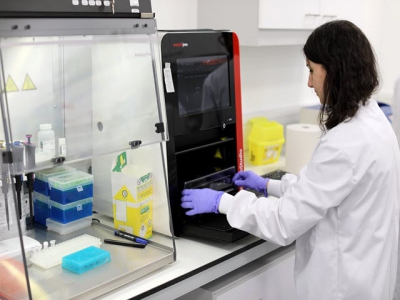A new alternative to antibiotics in aquaculture

Folium Science has developed a new partnership to extend the application of its “guided biotics” technology to farmed salmon.
Folium Science's in-feed treatment is also being deployed in the poultry sector
Called the AQUA Consortium, the new group includes renowned experts in aquaculture health plus scientists at Harper Adams University (HAU). They will be targeting bacterial pathogens that can cause mortality rates of up to 30 percent in farmed salmon and trout. Initial focus will be on Aeromonas salmonicida, with future work to develop multivalent products for multiple fish pathogens.
Folium’s guided biotics can be delivered in fish feeds and use CRISPR to identify and target specific sequences of DNA in the target unwanted bacteria.
Folium Science CEO Ed Fuchs says “The launch of our AQUA Consortium is an important step in our strategic development. The UK aquaculture industry is valued at more than £550 million annually and is growing rapidly. However, issues with bacterial pathogens are worldwide so we see huge commercial opportunities for the new products that the AQUA Consortium will develop.”
Although vaccines currently exist to help manage bacterial pathogens in farmed fish, outbreaks still occur, particularly at times of greater vulnerability, such as in early life or when fish are transferred from fresh water to sea water. The emergence of new pathogens has resulted in an increase in the use of antibiotics, driving the emergence of antimicrobial resistance and concerns across the industry and wider health sector. Folium Science’s guided biotics technology can target specific pathogens at time of increased vulnerability, whilst vaccination is given time to provide protective immunity.
Folium Science's technology is due to be deployed to increase the immunity of farmed salmon to bacterial diseases
Professor Simon Davies, a specialist in fish nutrition and editor-in-chief of International Aquafeed, will be working in partnership with Folium Science. He will also join the company's bench of industrial experts; a group of experienced individuals from across the agri-tech industry who advise and support the development of the company’s technology.
Supporting Professor Davies from HAU will be Dr Tharangani Heath, senior lecturer in aquaculture health and senior research scientist Dr Nilantha Jayasuriya. The team will also be collaborating with Dr Alex Wan of the National University of Ireland, Galway (NUIG), while salmon feed trials will be carried out at the Carna Research Station.
Professor Davies says: “This is a great opportunity to contribute our expertise in fish nutrition and aquaculture health to a vibrant and commercially focussed biotechnology business. Folium Science’s guided biotics technology has already proved its efficacy in monogastric agriculture so we look forward to demonstrating the opportunities in aquaculture. Given the opportunities that this represents, we welcome engagement and discussions with potential commercial partners”
To find out more about how guided biotics technology works, download the technical guide here. https://foliumscience.com/our-technology/
Related news
 Exporters worried as catfish exports to major markets drop
Exporters worried as catfish exports to major markets drop Exporters are mulling plans on how to increase shipments to the US and China after Covid-19 ends.
 Door to EU market wide open for Vietnamese aquatic products
Door to EU market wide open for Vietnamese aquatic products The EU has always been the second-largest market of Vietnam's aquatic export. When the Vietnam - EU Free Trade Agreement (EVFTA) takes effect, aquatic exports
 Khánh Hòa embraces advanced technologies for marine aquaculture
Khánh Hòa embraces advanced technologies for marine aquaculture The south - central province of Khánh Hòa will increase the use of advanced technologies in marine aquaculture in the next five years